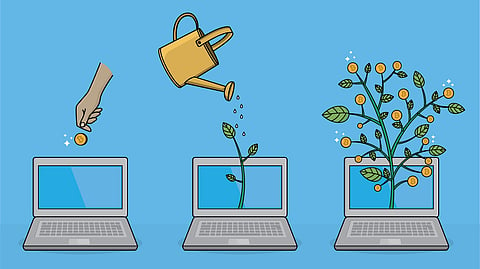Non-Fungible Tokens can make Indian agriculture profitable; but challenges exist
Recent research reports suggest that a lack of nutritional quality in food grains is worsening an already alarming situation. Amidst an array of challenges that lie ahead, there are specific marketing obstacles that hinder the sustainability of agriculture in the long run.
To transform agriculture, complete transparency in the supply chain and the adoption of traceability to understand the farm-to-plate journey is the need of the hour.
Emerging modern-day technologies, such as blockchain and the Internet of Things (IoT), among others, are gaining ground in agriculture thanks to modern agri-tech startups.
However, looking ahead, it is pertinent to discuss the future of Non-Fungible Tokens (NFT) to transform the agri-food structure for the betterment of farming in India.
NFTs are rare digital assets created using computer codes and registered on a blockchain ledger.
The NFT market in India is expected to expand with an annual growth rate of 8.6 per cent by 2028, and the overall value of the global NFT market is expected to rise to $231 billion by 2030.
The applications of NFTs would be instrumental in providing a platform for farmers to vocalise the sustainable practices they follow on the farm, along with involvement in smart contracts for timely payments, rather than suffocating in the traditional web of agri-marketing.
Carbon credit-based farming can also be linked with NFTs, and farmers can earn rewards/incentives for following environment friendly farming practices. Indian acceptance of NFTs in the agricultural domain would attract global brands to enter and capitalise on the evolving market space by creating their own ‘Opensea’ platform.
NFT could be linked with ONDC
NFTs can be linked under the government’s initiative of Open Network for Digital Commerce (ONDC), which can be used to promote transparency in the agricultural value chain, and more precisely, the nutritional value chains.
The strategy to implement NFT-based agricultural supply chain mechanisms can be taken up with a focused approach.
For example, at the initial stage, targeting specific crops from the country to consider under this initiative, like the One District One Product (ODOP) scheme. Another way could be the integration of selective agri-startups along with FPOs, such as 300 from PAN India, and then giving them a chance to pre-launch their products in such digital initiatives to understand market dynamics and break the monopoly of giant platforms.
Amidst the era of cloud kitchens and the foodverse, the food industry has already embraced the digital trend. However, it is high time to bring farmers to this space.
This scheme can also be extended to the organic corridor project of the country, especially the NAMAMI GANGE project, where organic food cultivation on the banks of the Ganga is already taking place. Such organic clusters, while finding a space in the modern digital world, can directly benefit farmers by connecting with buyers under a transparent mechanism.
These initiatives can also provide a significant push to the organic market in India and strengthen exports. A pilot project can be initiated with the produce of unique origin, the ones that have already been categorised under the Geographical Indications (GIs), which currently lack a transparency mechanism. NFT-based digital mechanisms can provide traceability to the stakeholders involved, offsetting counterfeit measures in these unique products.
Although the concept of NFTs has already been explored for e-commerce, there are certain challenges associated with it. Legal frameworks and tax-based policies are certain barriers for NFT-based digital platforms that must be addressed to provide a new shape to the Indian agriculture industry and secure the future of farming communities.
Views expressed are the author’s own and don’t necessarily reflect those of Down To Earth


